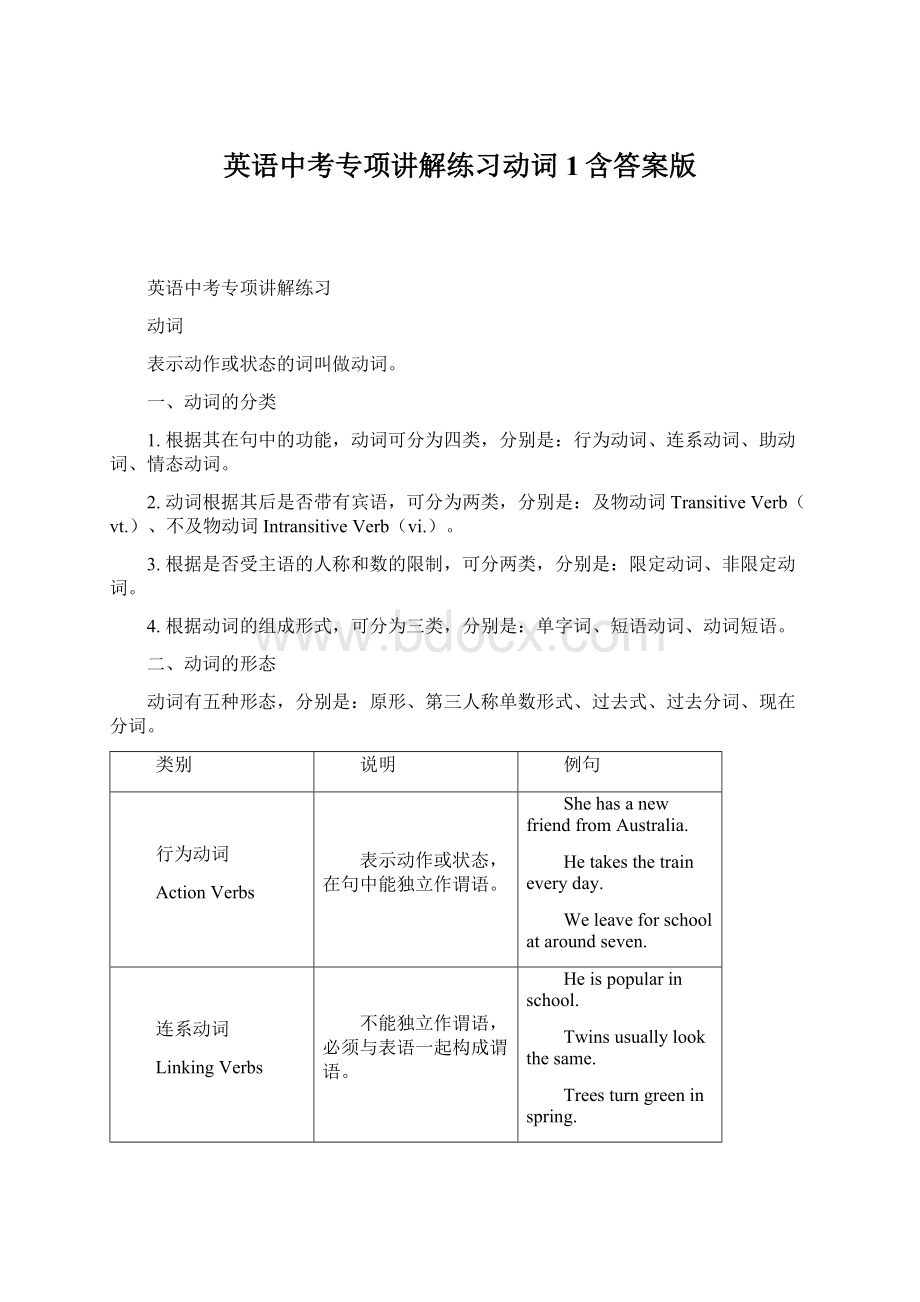 英语中考专项讲解练习动词1含答案版.docx
英语中考专项讲解练习动词1含答案版.docx
- 文档编号:8477192
- 上传时间:2023-01-31
- 格式:DOCX
- 页数:15
- 大小:29.29KB
英语中考专项讲解练习动词1含答案版.docx
《英语中考专项讲解练习动词1含答案版.docx》由会员分享,可在线阅读,更多相关《英语中考专项讲解练习动词1含答案版.docx(15页珍藏版)》请在冰豆网上搜索。

英语中考专项讲解练习动词1含答案版
英语中考专项讲解练习
动词
表示动作或状态的词叫做动词。
一、动词的分类
1.根据其在句中的功能,动词可分为四类,分别是:
行为动词、连系动词、助动词、情态动词。
2.动词根据其后是否带有宾语,可分为两类,分别是:
及物动词TransitiveVerb(vt.)、不及物动词IntransitiveVerb(vi.)。
3.根据是否受主语的人称和数的限制,可分两类,分别是:
限定动词、非限定动词。
4.根据动词的组成形式,可分为三类,分别是:
单字词、短语动词、动词短语。
二、动词的形态
动词有五种形态,分别是:
原形、第三人称单数形式、过去式、过去分词、现在分词。
类别
说明
例句
行为动词
ActionVerbs
表示动作或状态,在句中能独立作谓语。
ShehasanewfriendfromAustralia.
Hetakesthetraineveryday.
Weleaveforschoolataroundseven.
连系动词
LinkingVerbs
不能独立作谓语,必须与表语一起构成谓语。
Heispopularinschool.
Twinsusuallylookthesame.
Treesturngreeninspring.
助动词
AuxiliaryVerbs
不能独立作谓语,只能和主要动词一起构成谓语、表示否定、疑问、时态或其他语法形式
Idon’twanttogoforadrive.
Weareplayingbasketball.
Doyouliketomatoes?
情态动词
ModalVerbs
不能独立作谓语,只能和主要动词一起构成谓语,表示说话人的语气和情态。
情态动词没有人称和数的变化。
ShecanspeakalittleEnglish.
Ithinkyoushouldgotocollege.
Canyoucometomyparty?
三、行为动词
行为动词又叫实义动词,实义动词意义完全,能独立作谓语。
Mr.Smithgavehiswifetwentypoundsforherbirthday.
Heaskedtheteacherafewquestions.
Childrenandyoungpeoplelikebrightcolor.
Hedoesn’tlikeEnglish.(doesn’t是助动词,无词义,like是实义动词)
四、系动词
系动词又叫联系动词,它本身有词义,但不能单独用作谓语,后面必须跟表语,构成系表结构说明主语的状态、性质、特征等情况。
1.状态系动词
用来表示主语状态,只有be一词。
如:
Heisateacher(is与补足语一起说明主语的身份)
2.持续系动词
用来表示主语持续或保持一种状况或态度,主要有keep,rest,remain,stay,lie,stand。
Healwayskeepssilentatmeeting.(keep系动词silent表语,系表结构作谓语)
Thismatterrestsamystery.
3.表像系动词
用来表示"看起来像"这一概念,主要有seem,appear,look。
Helookstired. 他看起来很累。
Heseemsverysad. 他看起来很伤心。
4.感官系动词
感官系动词主要有feel,smell,sound,taste。
Thiskindofclothfeelsverysoft. 这种布手感很软。
Thisflowersmellsverysweet. 这朵花闻起来很香。
5.变化系动词
这些系动词表示主语变成什么样,变化系动词主要有become,grow,turn,fall,get,go,come,run.
Hebecamemadafterthat. 自那之后,他疯了。
Shegrewrichwithinashorttime. 她没多长时间就富了。
6.终止系动词
表示主语已终止动作,主要有prove,turnout,表达"证实","变成"之意。
Therumorprovedfalse. 这谣言证实有假。
Thesearchproveddifficult. 搜查证实很难。
Hisplanturnedoutasuccess. 他的计划终于成功了。
(turnout表终止性结果)
7.有些动词既可以作实义动词,又可以作系动词。
他们的用法不同,词义和句型结构也有所不同。
如:
Lookattheblackboard,please(look作实义动词)
Helooksalittletired(他看起来有一点疲倦,look作系动词)
五、助动词
协助主要动词构成动词词组的词叫助动词,他们本身没有词义,不能单独使用。
基本助动词只有三个,即be,do,have。
助动词的主要作用有:
1.表示时态,Heissinging.
2.表示语态,HewassenttoEngland.
3.构成疑问句,doyoulikecollegelife?
4.与否定副词not合用,构成否定句,Idon’tlikehim.
5.加强语气,hedidknowthat他的确知道那件事
六、情态动词
情态动词有时也会被归为助动词的一类,称为情态助动词。
主要有can/could,may/might,will/would(愿意),shall/should(将要),must,need,usedto(惯于;过去经常),dare(敢),oughtto).
1.情态动词放在谓语动词之前,如果谓语动词前有助动词,则在助动词前。
疑问句中,情态动词在主语之前。
Icanseeyou.Hemusthavebeenaway.WhatcanIdoforyou?
2.情态动词没有人称和数的变化,也没有不定式、分词形式或动名词。
3.部分情态动词有过去式和现在式,过去式只是用来表达更加客气、委婉的语气,时态性不强,可用于过去、现在或将来。
Hecouldbeheresoon.
Canyoupassmethebooks?
/Couldyoupassmethebooks?
4.情态动词表示肯定的猜测时,语气从强到弱为:
must(一定),will/would(很有可能),oughtto(应该,很有可能),shall/should(应该,很有可能),can/could(可能),may/might(可能)。
如果题干中有客观依据,则应选择语气最强的。
5.对比下列句子的语气
i.—MustIcomebeforedawn?
我必须天亮前来吗?
—Yes,youmust.是的,必须天亮前来。
—No,youneedn't.不必天亮前就来。
—No,youdon'thaveto.不必天亮前就来。
ii.—MayIsmokeintheroom?
我可以在这个房间抽烟吗?
—Yes,youmay.当然可以。
—Ofcourse,youmay[can].当然可以。
—No,youmaynot[mustn't,can't].不行。
(语气较生硬)
iii.—NeedIfinishittoday?
我必须今天完成它吗?
—Yes,youmust[haveto,should].是的,今天必须完成它。
(肯定回答不能用Yes,youneed,因为情态动词need只用于否定句或疑问句,不用于肯定句)
—No,youneedn't.不必今天就完成它。
—No,youdon'thaveto.不必今天就完成它。
同步练习
1.Mr.Wang______beinNanjingnow,hewenttoBeijingonlythismorning.
A.mustn’tB.maynotC.can’tD.needn’t
2.—MustIstayathome,Mom?
—No,you______.
A.needn’tB.mustn’tC.don’tD.maynot
3.—Canyougoswimmingwithusthisafternoon?
—Sorry,Ican’t.I______takecareofmylittlesisterathomebecausemymotherisill.
A.canB.mayC.wouldD.haveto
4.—MayIgotothecinema,Mom?
—Certainly.Butyou______bebackby11o’clock.
A.canB.mayC.mustD.need
5.TheboysaidhehadtospeakEnglishinclass,buthe______speakitafterclass.
A.couldB.didn’thavetoC.mightD.shouldn’t
6.MrZhangaskedme___thewordsagain.
A.readB.readsC.toreadD.reading
7.You___playontheroad.It'sdangerous.
A.mustn'tB.mayC.canD.must
8.It'snotanimportantparty,youneedn't___.
A.payforitB.wearitoutC.tryitoutD.dressupfor
9.CanI___abikefromhim?
A.lendB.returnC.giveD.borrow
10.—MustIstayathome?
—No,you___.
A.mustn'tB.needn'tC.maynotD.cannot
11.TheradiosaysTianjinwillbe___tomorrow.
A.rainsB.rainC.rainedD.rainy
12.Ifyoudon'tknowthisword,___inthedictionary.
A.lookforitB.lookatitC.lookafteritD.lookitup
13.Myfathertoldme___playonthestreet.
A.notB.tonotC.nottoD.didnot
14.Thereisgoingto___anEnglishpartythisevening.
A.beB.hasC.haveD.is
15.There___nobusstopherelastyear.
A.isB.wasC.areD.were
16.Ourschoolwillholdasportsmeetingifit___tomorrow.
A.isn'trainB.rainsC.won'trainD.doesn'train
17.Nohurry,please___yourtime.
A.takeB.bringC.carryD.catch
18.Ienjoy___thelightmusic.
A.tolistentoB.listeningtoC.hearingD.tohear
19.Please___assoonasyougetthere.
A.ringmeupB.ringupmeC.wakemeupD.wakeupme
20.Icalledhimandhe___tohaveatalkwithme.
A.stopB.stopsC.stopedD.stopped
21.—Wouldyouplease___meanevaser,Lucy?
—Certainly.Hereyouare.
A.borrowB.lendC.borrowedD.lent
22.—MustIfinishmyhomeworkinclassnow?
—No,you___.Youcandoitathome.
A.mustn'tB.maynotC.needn'tD.can
23.TheGreatGreenWallwillstopthewindfrom___theearthaway.
A.blowingB.blowC.blowsD.toblow
24.ThestudentswillgototheWestHillFarmbybike,ifit___finetomorrow.
A.willbeB.isC.shallbeD.was
25.Ourteacheralwaystellsus___inthestreet.It'stoodangerous.
A.don'tplayB.nottoplayC.toplayD.notplay
26.Thekiteisflyinghighinthesky.It___abird.
A.looksatB.lookslikeC.looksforD.looksafter
27.—Look!
What'sWangPingdoingoverthere?
—She___underabigtree.
A.singsB.sangC.hassungD.issinging
28.Yourradioistooloud.Wouldyouplease___?
A.turndownitB.turnitdownC.toturndownitD.toturnitdown
29.Couldyoutellmeifit___tomorrow?
A.rainsB.israiningC.willrainD.rain
30.Suddenlyoneofthebags___thetruckandlandedinthemiddleoftheroad.
A.felloutB.felldownC.felloffD.willbe
31.Teachersusuallyasktheirstudents___loudlyinclass.
A.tospeakB.speakC.speaksD.spoke
32.There'safootballmatch.Please___theTVatonce.Let'swatchtogether.
A.turnonB.takeoffC.turnoffD.goon
33.Pleasetellmewhere___haveourpicnictomorrow.
A.wewillB.weareC.willD.willyou
34.Atlast,LinFengmadethebaby___andbegintolaugh.
A.stoptocryB.stopcryingC.tostoptocryD.tostopcrying
35.Ihearthere___asportsmeetinginourschoolnextweek.
A.isgoingtohaveB.willhaveC.isgoingtobeD.aregoingtobe
36.It'sgettingcolder,Peter.You'dbetter___thiscoatwithyou.
A.bringB.carryC.takeD.get
英语中考专项讲解练习
动词
表示动作或状态的词叫做动词。
一、动词的分类
5.根据其在句中的功能,动词可分为四类,分别是:
行为动词、连系动词、助动词、情态动词。
6.动词根据其后是否带有宾语,可分为两类,分别是:
及物动词TransitiveVerb(vt.)、不及物动词IntransitiveVerb(vi.)。
7.根据是否受主语的人称和数的限制,可分两类,分别是:
限定动词、非限定动词。
8.根据动词的组成形式,可分为三类,分别是:
单字词、短语动词、动词短语。
二、动词的形态
动词有五种形态,分别是:
原形、第三人称单数形式、过去式、过去分词、现在分词。
类别
说明
例句
行为动词
ActionVerbs
表示动作或状态,在句中能独立作谓语。
ShehasanewfriendfromAustralia.
Hetakesthetraineveryday.
Weleaveforschoolataroundseven.
连系动词
LinkingVerbs
不能独立作谓语,必须与表语一起构成谓语。
Heispopularinschool.
Twinsusuallylookthesame.
Treesturngreeninspring.
助动词
AuxiliaryVerbs
不能独立作谓语,只能和主要动词一起构成谓语、表示否定、疑问、时态或其他语法形式
Idon’twanttogoforadrive.
Weareplayingbasketball.
Doyouliketomatoes?
情态动词
ModalVerbs
不能独立作谓语,只能和主要动词一起构成谓语,表示说话人的语气和情态。
情态动词没有人称和数的变化。
ShecanspeakalittleEnglish.
Ithinkyoushouldgotocollege.
Canyoucometomyparty?
三、行为动词
行为动词又叫实义动词,实义动词意义完全,能独立作谓语。
Mr.Smithgavehiswifetwentypoundsforherbirthday.
Heaskedtheteacherafewquestions.
Childrenandyoungpeoplelikebrightcolor.
Hedoesn’tlikeEnglish.(doesn’t是助动词,无词义,like是实义动词)
四、系动词
系动词又叫联系动词,它本身有词义,但不能单独用作谓语,后面必须跟表语,构成系表结构说明主语的状态、性质、特征等情况。
8.状态系动词
用来表示主语状态,只有be一词。
如:
Heisateacher(is与补足语一起说明主语的身份)
9.持续系动词
用来表示主语持续或保持一种状况或态度,主要有keep,rest,remain,stay,lie,stand。
Healwayskeepssilentatmeeting.(keep系动词silent表语,系表结构作谓语)
Thismatterrestsamystery.
10.表像系动词
用来表示"看起来像"这一概念,主要有seem,appear,look。
Helookstired. 他看起来很累。
Heseemsverysad. 他看起来很伤心。
11.感官系动词
感官系动词主要有feel,smell,sound,taste。
Thiskindofclothfeelsverysoft. 这种布手感很软。
Thisflowersmellsverysweet. 这朵花闻起来很香。
12.变化系动词
这些系动词表示主语变成什么样,变化系动词主要有become,grow,turn,fall,get,go,come,run.
Hebecamemadafterthat. 自那之后,他疯了。
Shegrewrichwithinashorttime. 她没多长时间就富了。
13.终止系动词
表示主语已终止动作,主要有prove,turnout,表达"证实","变成"之意。
Therumorprovedfalse. 这谣言证实有假。
Thesearchproveddifficult. 搜查证实很难。
Hisplanturnedoutasuccess. 他的计划终于成功了。
(turnout表终止性结果)
14.有些动词既可以作实义动词,又可以作系动词。
他们的用法不同,词义和句型结构也有所不同。
如:
Lookattheblackboard,please(look作实义动词)
Helooksalittletired(他看起来有一点疲倦,look作系动词)
五、助动词
协助主要动词构成动词词组的词叫助动词,他们本身没有词义,不能单独使用。
基本助动词只有三个,即be,do,have。
助动词的主要作用有:
6.表示时态,Heissinging.
7.表示语态,HewassenttoEngland.
8.构成疑问句,doyoulikecolleg
- 配套讲稿:
如PPT文件的首页显示word图标,表示该PPT已包含配套word讲稿。双击word图标可打开word文档。
- 特殊限制:
部分文档作品中含有的国旗、国徽等图片,仅作为作品整体效果示例展示,禁止商用。设计者仅对作品中独创性部分享有著作权。
- 关 键 词:
- 英语 中考 专项 讲解 练习 动词 答案
 冰豆网所有资源均是用户自行上传分享,仅供网友学习交流,未经上传用户书面授权,请勿作他用。
冰豆网所有资源均是用户自行上传分享,仅供网友学习交流,未经上传用户书面授权,请勿作他用。


 铝散热器项目年度预算报告.docx
铝散热器项目年度预算报告.docx
 运动训练方法与手段PPT资料.ppt
运动训练方法与手段PPT资料.ppt
 代理家长结对情况登记表表格文件下载.xls
代理家长结对情况登记表表格文件下载.xls
